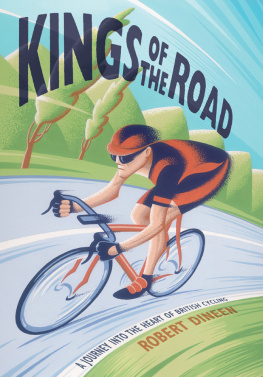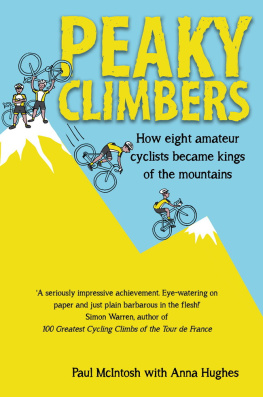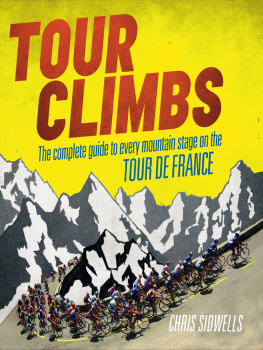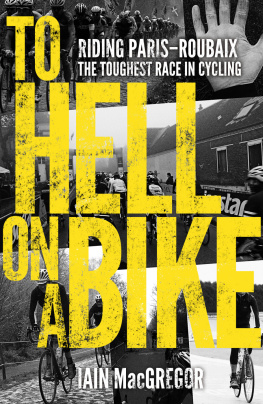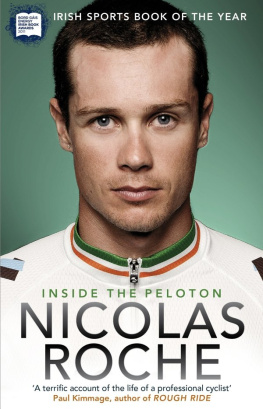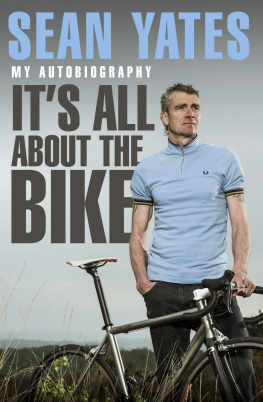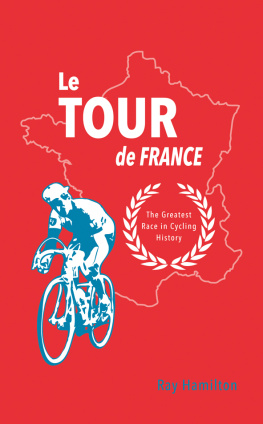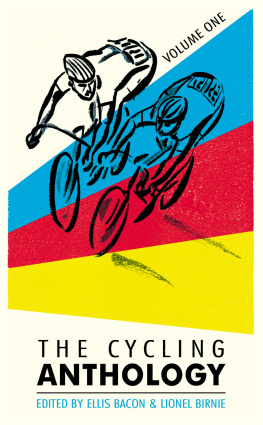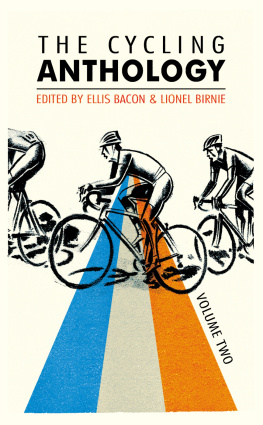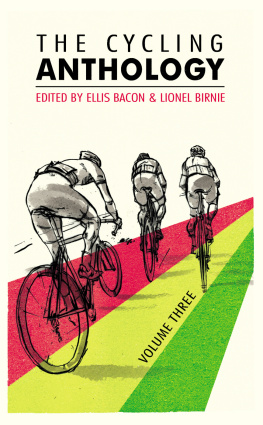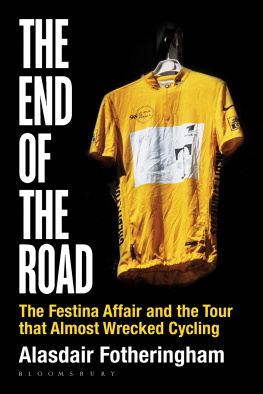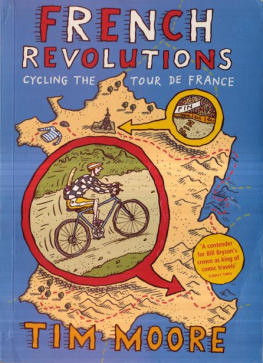
First published 2015 by
Aurum Press Ltd
74-77 White Lion Street
London N1 9PF
www.aurumpress.co.uk
Copyright Robert Dineen 2015
Robert Dineen has asserted his moral rights to be identified as the Author of this Work in accordance with the Copyright Designs and Patents Act 1988.
All rights reserved. No part of this book may be reproduced or utilised in any form or by any means, electronic or mechanical, including photocopying, recording or by any information storage or retrieval system, without permission in writing from Aurum Press Ltd.
Every effort has been made to contact the copyright holders of material in this book. However, where an omission has occurred, the publisher will gladly include acknowledgement in any future edition.
A catalogue record for this book is
available from the British Library.
ISBN 978 1 78131 354 1
eBook ISBN 9781781314760
eBook conversion by CPI Group.
CONTENTS
F or anyone familiar with the history of British cycling, the scene emerging on Blubberhouses Moor is an unlikely one. On a sunlit July morning, there are several thousand of us awaiting the Tour de France peloton; men and women, young and old, many in Lycra, some in their clubs gear, a few phoning home to ask if the TV helicopters overhead have caught them on camera. Racing bikes are strewn across the turf, Mexican waves have flowed through the crowd and a bagpipes player, also in Lycra, is belting out his third song since I arrived, yet the Tour de France peloton is not expected here for at least another hour.
Its incredible, all of it, says Michael Breckon, my companion and a stalwart of the sport, who has arranged for a group of us to take part in this magical weekend. The scene is especially moving for him because he grew up in nearby Harrogate, where todays historic stage will finish, with Princes Harry and William watching among other luminaries. Michael has been involved in every age of cycling, golden or otherwise, in Britain since the 1950s. As a shop errand boy who ran deliveries on his bike, he defied his middle-class mum to take up what was strictly a working-class pursuit. As a superb time-trialist, he competed in the sport when it was still recovering from the civil war that tore it part. As a national team manager, he held a key role when cyclings popularity sank into a depressing decline, becoming, as another cycling old-timer put it, a refuge for loners, eccentrics and the occasional lifelong enthusiast.
If youd told me that the Tour would come to the roads I cycled on as a kid, that I still ride on, and that there would be this amount of people... Michael says, his voice trailing off.
The numbers that have turned out for the spectacle in Yorkshire are certainly impressive. Police will estimate that five million people lined the streets to watch the Grand Dpart of the 2014 Tour de France, with three million of them travelling in from beyond the county borders. Christian Prudhomme, the Frenchman who is director of the Tour, has been so moved by the scenes that he will declare it the most successful Grand Dpart of all.
Nowhere has the sports recent resurgence in popularity in Britain been more memorably expressed. Presumably the spectacle will help to ensure that the renaissance continues, adding yet more recruits to the three million of us who cycle in Britain now at least once a week, filling the urban bike lanes and drawing thousands to sportives, and encouraging governments to invest hundreds of millions of pounds in making roads better suited to the pursuit. Presumably it will also help the already burgeoning cycling industry, with its equipment and clothing and touring holidays, its increasing numbers of magazines and websites (and, yes, books). We live in straitened times, but cycling is booming.
Just consider the group of friends that Michael has gathered. They include a retired Army officer who runs cycling holidays across old battlefields, several senior executives who would rather network in the saddle than on the golf course, a middle-aged woman who trains almost as hard as any leisure cyclist I have met, and a geologist who chooses his work according to the quality of cycling country close to the dig site. Another is father to a recently retired British world champion Katie Colclough. Perhaps Britain has produced so many world champions in recent years that it is hard to organise a cycling trip without bumping into somebody with a connection to one.
From Sir Bradley Wiggins, Mark Cavendish and others who have ridden on the road for Team Sky, to Sir Chris Hoy and Britains all-conquering track team, the success of Britains professional cyclists in the twenty-first century has, of course, been crucial to the sports resurgence. They have helped to inspire millions of people to take up cycling or to pursue it more seriously than they previously had, or, in some cases, to embark on a career in the sport.
As a result, the cyclists and their stories are deservedly well known. We have read about Wiggos mod music collection and his absent father. We have marvelled at the story of how Chris Froome learnt to ride on African plains. We know how hard Victoria Pendletons father pushed her when she was growing up. They all rode at a time when cycling was in the mainstream, so they were all asked to tell their tale.
But what about the heroes who competed before cyclings renaissance? Have all their stories been properly told? Aside from a few notable exceptions Tom Simpson and Brian Robinson, for example I think not because I have spent the past year interviewing a selection of the most compelling and found that most of them had rarely, if ever, been asked to tell their tale in any depth. Though this seemed an oversight, I was glad to be given the opportunity to correct it because their stories were often fascinating. To me, their achievements were especially inspiring because they lacked the support provided to the modern cyclist, forcing them to make even greater sacrifices than their successors have done and to overcome even longer odds.
In an attempt to write a character-based and unashamedly idiosyncratic history of the sport until the turn of the new century, I spoke not necessarily to the most successful cyclists of the past, but to those whose careers I found the most interesting. Often they were individuals whose name cropped up the most frequently while I was riding with my club, delighting in cyclings rich but often untapped oral history. Always I chose only those subjects whom I could meet, picking interviewees from successive generations, in the hope of demonstrating to the many new cyclists in Britain what the sport used to be like and how far it has progressed. This meant speaking to people at different levels of the sport, too at the grass-roots and the elite. It felt appropriate because, historically, the connection between the different levels of cycling seemed unusually strong, at least compared to more popular sports. I have also taken the liberty of writing about my consequent journey from being an outsider to the very heart of the sport. I was inspired by what Michael said to me once: I think it was Cicero who said that, without an understanding of the past, the present is of little interest. You have all these new cyclists and there is so much history for them to discover. You could fill several books with the stories still waiting to be told.
I n a dining room above a pub in Covent Garden, the great and the good of British cyclings past are swapping mildly inebriated insults across the floor and, frankly, I am concerned. If the men of the Pedal Club and it is only men, unfortunately are in the mood for making affectionate fun of one another this afternoon then I fear that, as the post-lunch speaker, I am about to feel the sting of their sarcasm.
Next page
